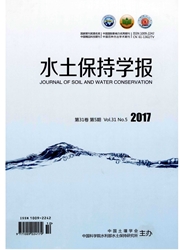

 中文摘要:
中文摘要:
从土壤N,P,K及土壤有机质等方面研究了人为干扰(包括放牧、开垦和禁牧)对典型草原生态系统土壤养分含量的影响。研究结果表明:开垦和放牧会导致土壤,主要是表层土壤养分含量的下降,而开垦对土壤养分的影响更为明显;禁牧会提高土壤各种养分的含量,而且随着禁牧时间的增加,土壤养分含量有逐渐增加的趋势。对深层土壤养分含量没有明显影响。同时,草原生态系统土壤全氮、速效氮及有机质含量与土层深度呈明显的负直线相关关系;速效K、速效P含量则与土壤深度的关系符合二次幂函数关系;全磷含量随深度的增加有逐渐升高的趋势;土壤全钾含量随土壤深度的增加呈微弱的降低趋势,但变化不明显。本研究表明,禁牧可以提高典型草原土壤养分元素的含量,有利于遏制草原土壤的退化。
 英文摘要:
英文摘要:
The impact of human disturbances including grazing, cultivation and anti-grazing (from 1987,1997, 2003 respectively) on nutrients contents(N, P,K and organic matter) in typical grassland soil was studied in the paper. The result showed that cultivation and grazing can lead to a decrease in nutrient contents of soil, especially topsoil, and cultivation affects it more significantly than grazing; Banned-grazing can increase nutrients contents of soil, which increase with banned-grazing period. At the same time, there exist significant minuslinear dependency relationship between the total N,available N,organic matter and soil depth; there exist second power function relation between available P,available K and soil depth. The total P contents increases with the soil depth, and the total K decreases with it, but the dependency relations were not significant. It is concluded that anti-graz- ing can increase the nutrient contents in grassland soil and restrain the degradation of grassland soil.
 同期刊论文项目
同期刊论文项目
 同项目期刊论文
同项目期刊论文
 Effects of regenerating forest cover on soil microbial communities: A case study in hilly red soil r
Effects of regenerating forest cover on soil microbial communities: A case study in hilly red soil r 期刊信息
期刊信息
